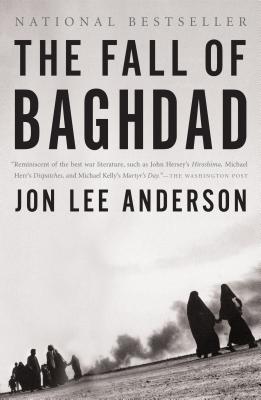
The Fall of Baghdad
کتاب های مرتبط
- اطلاعات
- نقد و بررسی
- دیدگاه کاربران
نقد و بررسی

Starred review from July 5, 2004
New Yorker
writer Anderson's eyewitness account of the invasion of Baghdad is a thoughtful document of war, written with stunning precision. Anderson arrived in Baghdad during the eerie calm before air strikes began in March 2003. While questioning ordinary Iraqis about their country's future, he also traveled to Iran, where he interviewed war-weary Shiite Iraqi refugees. Back in Iraq, Anderson sought out members of Saddam's Baath Party and probed the ambiguous nature of their relationship with their dictator: Ala Bashir, a plastic surgeon and artist who was close to Saddam, provides Anderson with a character study rich in contradiction. Equally compelling is a poet named Farouk, whose accounts of cocktail parties under Saddam have, in Anderson's recounting, a tension and irony reminiscent of Cold War Hitchcock thrillers. Anderson also makes his openly anti-Saddam driver, Sabeh, a key character and a link to Iraqi quotidian culture. In a voice refreshingly free of machismo, Anderson proffers an inside view of war reporters' scramble to cover events and of life at the Rasheed and Palestine hotels, where most journalists stayed. In this original narrative (not a collection of his New Yorker
pieces), Anderson's unobtrusive voice mediates the voices of others faithfully and with humanizing integrity, resisting any impulse to convert what he observes into political argument. Instead, he collects grimly cinematic snapshots of Iraqi casualties that will haunt readers even after the invasion has receded into history. Agent, The Wylie Agency.
(On sale Sept. 23)
Forecast:
Anderson's visibility via the
New Yorker will mean major reviews and healthy sales.

Starred review from October 1, 2004
To live on a knife's edge for nearly 400 pages is exhausting. This is the impact of reading Anderson's (The Lion's Grave ) memoirs of residing in Saddam Hussein's Iraq from 2000 and experiencing both the approach of war in March 2003 and the country's continuing chaos and violence in April 2004. The terror of the Iraqi regime, the emotional intensity of the buildup to war, the horrific devastation wrought by American arms, and the sectarian violence between Sunni and Shi'ite Muslims envelop Anderson's life and descriptions, nearly overwhelming the text. Yet the narrative avoids a personal polemic tone; only once does Anderson break his dispassionate journalistic code to weep over the bodies of two dead children. Hatred of Saddam, suspicion of U.S. policy and tactics, and views regarding the internecine religious strife emanate clearly enough from the Iraqis interviewed. Rendered in compelling and lucid prose, this story of deceit, terror, death, and searing religious hatred evokes a great sense of despair and a deep sadness. Highly recommended.--John F. Riddick, Central Michigan Univ. Lib., Mt. Pleasant
Copyright 2004 Library Journal, LLC Used with permission.

























دیدگاه کاربران